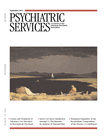Sleep Problems, Psychiatric Hospitalization, and Emergency Department Use Among Psychiatric Patients With Medicaid
Abstract
Objective:
This study examined the prevalence of sleep problems and their association with the use of inpatient and emergency department services by Medicaid recipients with serious mental illness.
Methods:
The sample consisted of 1,560 psychiatric patients with Medicaid coverage who were identified in a ten-state random survey of psychiatrists. Sleep problems were assessed by clinician ratings.
Results:
Over 75% of the patients experienced a sleep problem, and approximately 50% of these patients had problems that were moderate to severe. Greater sleep problem severity was associated with an increased risk of psychiatric hospitalization and emergency department visits for mental health reasons.
Conclusions:
Sleep problems were highly prevalent among Medicaid patients with serious mental illness and were associated with greater inpatient and emergency mental health service use. More careful monitoring and management of sleep problems in this patient population could address a common clinical need and might help to reduce costly service use. (Psychiatric Services 62:1101–1105, 2011)



